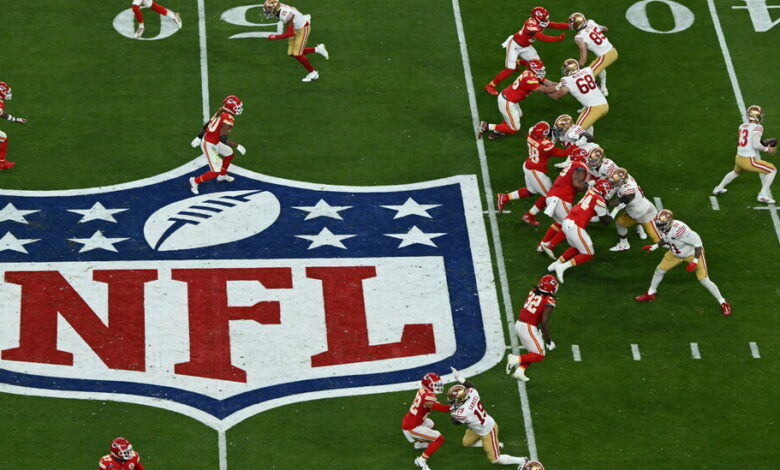Netflix and the N.F.L. Sign a Three-Season Deal

Netflix is no longer simply in the “sports-adjacent” business. On Wednesday, the streaming giant announced a three-season deal with the National Football League that will include showing two Christmas Day games on its service this year. It’s the first time Netflix has become partners with a major sports league, and it likely won’t be the last.
The move follows Netflix’s increasingly aggressive push into the business of live events. In the past two weeks, “The Roast of Tom Brady” was its most-watched English-language TV show; a quirky six-day John Mulaney talk show went viral as part of the Netflix Is a Joke live comedy festival in Los Angeles; and the stand-up special “Katt Williams: Woke Foke” was viewed 4.3 million times.
“Last year, we decided to take a big bet on live — tapping into massive fandoms across comedy, reality TV, sports and more,” Bela Bejaria, Netflix’s chief content officer, said in a statement. “There are no live annual events, sports or otherwise, that compare with the audiences N.F.L. football attracts.”
The streaming business has matured in the United States, and though Netflix is the dominant service, it still needs to keep growing. With subscriptions relatively maxed out in America, the growth of other revenue streams has become crucial to the company’s success. Advertising is chief among them.
At a time when more people are dropping their traditional cable subscriptions, live sports remain catnip for advertisers because they are one place where audiences are guaranteed in real time. That is especially true for the N.F.L., which remains a ratings juggernaut.
Last month, Netflix announced that its lower-priced subscription service, which features ads and is roughly a year old, grew 65 percent in the first quarter of the year. Netflix has roughly 270 million overall subscribers worldwide.
“This shows just how serious Netflix is taking advertising, because you don’t do this unless you are fully committed, all in, on how big you think this is going to be,” said Richard Greenfield, media and technology analyst at Lightshed Partners. “This is them putting a stake in the ground saying, ‘We’re here, we’re going to grow much, much bigger in advertising and this is effectively Day 1.’”
Netflix has also committed to so-called sports-adjacent live programming. In January, it reached a multibillion-dollar, 10-year deal for the exclusive rights to stream World Wrestling Entertainment’s flagship weekly wrestling show, “Raw.” And in March it announced that it would stream a boxing match between Mike Tyson and the social media influencer Jake Paul live in July.
While the N.F.L. deal is a first for Netflix, it is a continuance of the league’s streaming strategy.
Amazon began streaming Thursday night games exclusively on its Prime service in 2022. In January, NBCUniversal showed an N.F.L. playoff game on Peacock, the first time in the league’s history that it granted a streaming service exclusive rights to a playoff game. The company paid $100 million for the rights, generated 23 million viewers and called it “the most streamed live event in U.S. history.” (N.F.L. playoff games traditionally lure around 30 million viewers.)
For the past two years, the N.F.L. has broadcast three games on Christmas, challenging the N.B.A.’s stronghold on the winter holiday. As part of this new deal, Netflix will stream at least one game on the holiday in 2025 and 2026.
Roger Goodell, the N.F.L. commissioner, is leaning in on streaming as broadcast television continues to recede in popularity.
“Our fans are on these platforms,” Mr. Goodell told reporters during the week of the Super Bowl. “Our fans want to access them. The technology is extraordinary. You can do things on some of these platforms that you can’t do on the linear platform. For us, it’s part of the future.”
While the Netflix games will be simulcast on broadcast television for free in the competing teams’ cities, Netflix and others are likely to make a bigger investment in the N.F.L. and other sports in years to come. Streaming, for instance, is already playing a role in current negotiations over future rights to show National Basketball Association games.
“This feels like a watershed moment for linear TV,” Mr. Greenfield, the analyst, said. “Getting the king of premium streamers to say we are in the sports business for real is a pretty big deal for television. Because it doesn’t matter what this means now — it just shows you you’ve got another serious bidder for sports rights.”
Emmanuel Morgan contributed reporting from New York.



